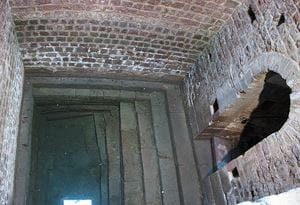
Religion Behind the Scenes spotlights the less discussed, but no less crucial, tasks that keep religious communities running, and the people who make it all happen.
Like most of the world’s great religions, ritual washings and symbolic cleansings are also found in Judaism, one of the world’s oldest religions. From very early in its history, the concept of a ritual purification bath, or “mikvah,” has been part of Jewish practice. (Leviticus 15:19-24, 18:19 & 20:18) Used to cleanse the practitioner of various defilements that would make one “unclean” (according to the Law), mikvot remain an important part of piety and Jewish life.
Since 2013, Sara Wolkenfeld has been the mikvah director at the Adam R. Straus Memorial Mikvah, in Chicago, IL. In this Religion Behind the Scenes interview, she shares with us a bit about what a mikvah is, some of the different circumstances in which it is employed, and what it means for practitioners of Judaism.
For someone who doesn't know what a mikvah is, how would you explain it?
It's a Jewish ritual bath that stems from biblical commandments—and it’s something we can trace back through Jewish history. Anciently, the system of purity and impurity was a major part of Jewish ritual life, much like how keeping kosher or keeping Shabbat would be today.
If you're a non-Jew living in Manhattan, for example, you probably have some passing acquaintance with certain Jewish rituals. You might notice things like kosher restaurants, or people going to synagogue on Shabbat. These are basic things that are identifiable with observant Jewish life. However, a mikvah is a more private practice. It doesn’t have that same cultural symbolism. But when there was a central Temple in Jerusalem, purity and impurity were a major part of ritual life, and the mikvah was part and parcel of that. People would immerse in a mikvah to removed certain types of impurity. A mikvah is one of the markers of a functional observing Jewish community. So, just as someone moving into a new community would look for a house of worship, and maybe a good school for their children, a mikvah is right up there on the list. So, it's really definitional to a Jewish community.
Tell me a little bit about the types of rituals that you oversee as director of your community’s mikvah.
I think it's fair to say that the primary function of mikvahs nowadays is for women who observe the Laws of Niddah; the laws that govern a woman's menstrual cycle. When a woman has her period, or when a woman has any flow of uterine blood—and for seven days thereafter—she is restricted from having sex with her husband. After that time, she goes to the mikvah, immerses herself, and then is once again able to fully engage sexually with her partner. I think most people who use mikvahs nowadays are probably women who are observing those laws. But not all. There's been a kind of modern return to mikvah, so that people, especially women, identify with mikvah for all sorts of reasons. So, they might be having a birthday (usually like a milestone birthday) or observing a yahrzeit (the anniversary of the passing of a loved one), or marking some kind of life transition, or hoping to get pregnant. There are all sorts of reasons why women feel that coming to the mikvah will be a source of purity for them, or just a source of renewal or inspiration. So, we see a wide range of people coming in for various reasons.
Is the mikvah, and its connection to the Laws of Niddah, something that is less of a concern to the more progressive Jewish traditions?
Yeah, I think that's fair to say. It’s basically the same as any traditional observance, which is most likely to exist in an Orthodox or to the right of Orthodox community. And, for Conservative, Reform, or Reconstructionists Jews, it's more optional.
Could you walk us through what happens in a mikvah?
So, the experience starts with welcoming the woman. In most cases, we know why a woman is coming to our mikvah. It is usually because of the Laws of Niddah. However, we don't know anything else about her life or her world. We don't know what she left behind in order to come. We don't know how she feels about the experience. So, the job of an attendant is to help the woman to have the experience she wants to have. Our purpose, really, is to just sort of blend into the background; to be present for whatever experience the woman who's coming to immerse herself wants to have. You really take your cues from the woman who comes.
We would first show her to one of our preparation rooms, which are basically nice bathrooms with a shower and a bathtub. And we make sure she's oriented to the space, because we want to make sure that she knows where to find everything that she’ll need. We want to make sure that she feels comfortable in the space, and we want to allow for whatever experience she needs to have.
Once they've decided that they're ready to immerse, then they would let us know via the intercom. At that point, they're wearing a robe and some paper slippers, which we provide. It’s kind of like being in a spa. We’ll escort them down a private hallway to the mikvah room itself. The mikvah looks basically like a small pool, and the water is brominated.
At that point, we will ask the woman if there is anything that she would like us to check; is there anything else that she needs to be ready to emerge? There's a big range of possibilities here. The premise of the mikvah is that your entire body needs to come in contact with the water simultaneously. So, anything that separates your body from the water is potentially problematic. So, a woman might say, “Oh, I forgot to take my necklace off.” Or “I forgot to this Band-Aid.” Or “I just showered. Do I have any stray hairs stuck to my back?” The woman who is immersing is the one who decides when she's ready to immerse. So, if a woman says “Yes, please check my back for loose hairs,” then we'll do that. And if a woman says, “Nope, I'm good! I'm ready.” Then that's great, too. We'll respect whatever the woman's decision is.
So, when a woman has decided that she's ready to immerse, what happens then?
I will turn my back and step out of the space a little bit while she removes her robe, goes into the water, and gets comfortable. Then I’ll tell her to let me know when she's ready for me to witness her emersions. A mikvah attendant’s only legal role is to make sure that everything goes under simultaneously during each immersion. Each time she comes up for air, I'll say “Kosher” if every part of her immersed at the same time. If her hair wasn't under or an arm was sticking out, I’ll let her know and she’ll redo the immersion. Typically, a woman will immerse three times—once, and then a blessing, and then two more times. At that point, women will sometimes want to spend a little bit of extra time in the mikvah to reflect or recite a prayer. So, we'll give them the option of staying in the water and letting themselves out when they are done. If they want out immediately, we’ll stand at the top of the steps, hold up the robe so that we can't see her as she exits the water. Once she’s robed, we escort her back to the prep room where she can get dressed and go home. That's more or less what would happen.
What motivates you, and the 20 to 25 volunteers you have, to do this work?
I think there is a range of motivations. For me, I value the opportunity to enable this mitzvah. And it's important to me this mitzvah—which is really exclusive to women—happen in a space that is run by women, controlled by women, and feels sensitive to the needs of women. Sadly, that's not always the case for mikvahs everywhere. And so, it's really important to me to allow that to happen. A mikvah is a very vulnerable kind of space, either because you must undress and go into the water naked, or because it is a time when women reflect on fertility, family choices, and transitions. It’s an important religious experience, but it's not always a powerful experience for people. I don't feel like it's my role to mandate that it be powerful. There are plenty of women who go every month, and they feel that it’s not their most powerful religious experience. I don't think that it has to be. And then there are women for whom it's transformative. And I want to hold space for all of that. So, I do what I do so that women can have this range of experiences, regardless of what brings them to the mikvah. I want to help people have the experiences they want to have.
What are some misconceptions that people have about the mikvah?
I think the biggest misconception is the idea of secrecy surrounding the mikvah. “Secrecy” is different than “privacy.” Secrecy is more often just a step away from shame; whereas privacy is sort of something that we value and hold close, but not necessarily something that we're ashamed of. I often encounter women who believe that it needs to be like the deepest darkest secret that they're using the mikvah. And I think that is certainly not how the system was intended. There needs to be respect for people's privacy, but not a sense of secrecy and shame. So that's one common misconception.
There’s also a misconception regarding the mikvah as a space for prayer, or even a place where superstitions are kind of played out. For women for whom the mikveh is powerful, I think they should feel free to capitalize on that and recite whatever prayer feels comfortable in that space. But I also want women to know that it's okay if the mikvah isn't that space for you. You could also go to synagogue to pray or recite a prayer at home. I want to break people of the notion that, for example, a prayer for fertility has to happen at the mikvah because I've seen women who don't really feel comfortable participating, but who believe that the secret to getting pregnant is loving the mikvah and really investing their whole religious self in it. And I personally don't I don't think that that's the most generative spiritual practice.
Are there aspects of you job, as the manager of a mikvah, that might surprise people?
Never in my life did I expect to feel so bad about my sheer inability to deal with leaking pipes and thermostats that break, and valves and stuff not working. It’s been shocking to me how upsetting that can be, and how powerless I can feel in the face of that. I think it would surprise people how much I've wished that I were actually a plumber. That has surprised me.
And the other thing is just the “always on call nature” of the job. Most Jewish things you can do by yourself. They may be more meaningful in community, but you can do them by yourself. But you can't just produce a mikvah on your own. And so, if you are a traditionally observant Jew, you need a willing helper, and you need a mikvah to make that happen. Immersion is something that is often considered time sensitive, and a mikvah attendant is a necessary component of meeting that need. I remember, for example, there was a woman who was trying to get pregnant and, often, ovulation can fall on, or close to, mikvah night. So, she felt that if she waited another night to go to the mikvah, she might be risking not getting pregnant. She was flying home that night, and her flight was to land at 10pm. We scheduled her for 10:45pm. But our mikvah is housed in the synagogue, and the synagogue has an alarm that automatically turns on at around 12:30 or 1am. If you open any door after that, it automatically sets off an alarm and calls the Police Department. We initially felt like we would be just fine time-wise, except her flight got delayed. So, even though I wasn't the attendant for the night, I didn't go to bed because I kept checking in with the attendant: “Have you heard from her?” “Did she land yet?” “Is it going to be okay?” And, in the end, I stayed up. So that was one crazy thing. Again, you really you don't know where someone's coming from, but if they're really trying to get pregnant, every night counts. And you don't want to miss a night, especially if your doctor has told you “This is when this seems like you're ovulating.” So, you know, we'll do our best to accommodate women when they need to get to the mikvah.
And sometimes women have really urgent needs around other things. We had a woman, for example, drive in from out of state to observe her partner's yahrzeit. And, for her, it had to be that night. And so, as urgent as a mikvah might seem to a woman who was struggling to get pregnant, the woman commemorating her partner’s death also wasn't going to miss that important night.
What can you tell me about the keilim mikvah—the immersion of utensils, plates, pots, and pans? If I've gone to IKEA, and bought a pot, and I go to the keilim mikvah with it, what does that experience look like?
Well, first of all, the basic idea is that if the item is purchased from a Gentile—which is basically everything, right?—then you would immerse it when you first purchase it, before you use it for the first time. Also, there's some level of disagreement about what needs to be immersed. So, you would want to check with your local halakhic authority as to which things you’ve bought need to be immersed. Metal pots for sure. But there are questions about things like ceramic, china, or wood. It just depends on the material.
As to the process, you first want to make sure that your pot is “naked.” So, you might need to get yourself some “Goo Gone,” depending on what's on the pot, like sticky residue from a label. You're gonna need to peel any labels off. It is the same basic principle as a person mikvah; you want the water to have contact with all of the pot. Once the labels and any residue are removed, then you just immerse it in the keilim mikvah. Usually there are baskets or mesh bags to use when immersing.
So, for example, you stick all of the silverware in a mesh bag and then you just drop the whole thing in the mikvah and pull it out. Of course, I would definitely plan to make a blessing when I immerse items.
There is not going to be a keilim mikvah in every community. But though you might not want to dunk your body in Lake Michigan, because it's really cold for much of the year, and the naked thing is complicated—to dunk your pots and pans in Lake Michigan is maybe not such a big deal. And sometimes women who are in places where there's no keilim mikvah will just bring their pots and pans to the person mikvah.
You see the use of a keilim mikvah most prevalent in Modern Orthodox, Centrist Orthodox, and Haredi for sure. At some Orthodox stores, they'll actually have a keilim mikvah in the back. Not everywhere, but I'm from the New York area, and there are stores (in places like Muncie) where we would go to buy stuff for Pesach and, at the back of the store, there's a small keilim mikvah. You can do your shopping, dip what you bought, and then go. But I don't have any reason to believe that the keilim mikvah is part of the more liberal traditions.
Talk to me a little bit about men and their use of a mikvah. Does your mikvah allow for men also, or is it just for women?
Yes, our mikvah is open during the day for men. Some communities will have a separate men's mikvah and women's mikvah, and some will not.
At its core, men's use of the mikvah stems from ancient issues of purity and impurity, much as women’s did; with the important difference that, from a traditional Jewish legal perspective, women are forbidden to have intimate relations until they've removed that particular type of impurity, whereas there are no current prohibitions on men, even if they remain impure. So, a man who has a seminal emission is impure, but we just don't really care anymore. So, there's no halachic ramifications of that impurity; nothing that he can't do. He could still have sex, he could still pray, he could still go to synagogue, he could still touch a Torah scroll. There's no actual legal ramifications. However, many men have the tradition of going to a mikvah to remove that form of ritual impurity anyway.
As a kind of spiritually uplifting experience, some men will go prior to the High Holidays. Many men will go prior to their weddings, because a wedding is perceived (by some people) as a kind of mini Yom Kippur. In the Hasidic world, I believe, many men go daily, or certainly before Shabbat. I believe male Chabad rabbis have the tradition to go daily. Some sofers or scribes will go regularly before they write. So, it's really men who do it as a sort of traditional practice before certain sacred event.
How is the mikvah for conversion performed differently than if someone is participating for the Laws of Niddah?
The preparation and process would basically be the same. The main difference in a conversion mikvah is in who's present for that. An immersion for the sake of conversion needs to be witnessed by a beth din—a Jewish court of three people. In Orthodoxy, that would be three male rabbis but, in other traditions, it could be three qualified witnesses of any gender. In the Modern or Centrist Orthodox world, the beth din (of three men) would interview the person right before they go into the mikvah, asking a few last questions, like “Do you really want to accept God? Do you accept the Torah? Do you really want to do this?” And then the person would go into a prep room and get ready and then would immerse in the mikvah. The beth din needs to certify that the person has gone completely underwater. So, there are various was to ensure this is done modestly. In Orthodoxy, while she's underwater, the men will stick their heads in and confirm that they don't see her, or she'll immerse naked privately and then immerse again in like a large t-shirt with them watching. I once helped with a conversion where the woman went under the water, and then we put a sheet over the water while she was under, and then they stuck their heads in and then left—and then she came up. So, there are several ways in which this could be done.
What does immersion in a mikvah symbolize to the convert?
It depends on the individual convert, but I would say that mikvah in general is a sign of transition from one status to another. And that's how we see it used throughout Jewish tradition. The person is transitioning from one legal status to another, or one spiritual status to another. Or maybe there's some of both. And that's really what's going on symbolically with the mikvah.
Interview conducted by Alonzo L. Gaskill and Shira Telushkin; transcribed, edited, and condensed by Alonzo L. Gaskill.
ABOUT ALONZO L. GASKILL, PH.D.
Alonzo L. Gaskill is an author, editor, theologian, lecturer, and professor of World Religions. He holds degrees in philosophy, theology/comparative religion, and biblical studies. He has authored more than two-dozen books and numerous articles on various aspects of religion; with topics ranging from world religions and interfaith dialogue, to scriptural commentaries, texts on symbolism, sacred space, and ritual, and even devotional literature.
7/13/2022 10:03:19 PM









